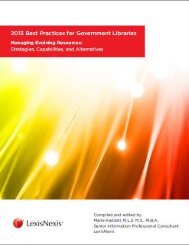2012 Best Practices for Government Libraries
2012 Best Practices for Government Libraries
2012 Best Practices for Government Libraries
You also want an ePaper? Increase the reach of your titles
YUMPU automatically turns print PDFs into web optimized ePapers that Google loves.
Veterans History Project: Preserving Veterans Memories<br />
182<br />
BEST PRACTICES <strong>2012</strong><br />
By Bob Patrick, Director, Veterans History Project, American Folklife Center, Library<br />
of Congress<br />
‘Dad, you never told us that be<strong>for</strong>e.’ or ‘I didn’t know she served in Vietnam.’ These<br />
are comments that are often heard by individuals participating in the Library of<br />
Congress Veterans History Project of the American Folklife Center. Veterans from<br />
World War I to the conflicts of today in Iraq and Afghanistan are providing their<br />
memories of what it was like to serve in the military in a time of war. - What was<br />
their human experience of war? How did they feel when Pearl Harbor was attacked?<br />
How cold was it in Korea in 1952? How do they reflect on their service in Vietnam?<br />
In looking back, what did military service mean to them later in life?<br />
The Veterans History Project, or VHP, is a congressionally mandated ef<strong>for</strong>t to collect<br />
the personal recollections of America’s wartime veterans. Over the last twelve<br />
years, it has grown to be the largest oral history project of its type in American<br />
history; amassing over 83,000 collections. At the heart of the project are audio and<br />
video interviews of men and women talking about their experiences. VHP works to<br />
ensure all stories get included, not only the accounts from the frontline fox holes<br />
and combat mission cockpits but also from the medical tents and mess halls. It is<br />
emphasized that all stories are important in providing a grassroots look of what it<br />
was like to be there with the excitement, fear and even boredom of going to war.<br />
The VHP also takes in original materials to include letters, photographs, personal<br />
military papers, diaries and memoirs. These items expand the veteran’s story in a<br />
very personal way by capturing innermost thoughts and impromptu pictures taken<br />
of everything from barracks life to post combat mayhem. Letters often provide the<br />
most intimate insights from a passionate love letter written on a flight to Vietnam<br />
to a missive home from the trenches in World War I. Each of these items has the<br />
fingerprints and DNA of our veterans going back nearly 100 years.<br />
The Veterans History Project archive has become a resource <strong>for</strong> many researchers,<br />
educators, and interested civilians. There has been a steady stream of inquiries <strong>for</strong><br />
scholarly works, books, documentaries and in<strong>for</strong>mation searches. With over 100<br />
new collections being received every week and 11,500 digitized collections on line,<br />
the archive continues to expand and mature with an aspect of diversity in<br />
experiences, military services, gender, and ethnicity.<br />
To create such an expansive collection, VHP has relied on a nation-wide public<br />
participation ef<strong>for</strong>t. Congress felt that by encouraging local volunteers to collect<br />
these stories citizens, communities and family members would learn from the<br />
veterans in their lives and better appreciate the sacrifices they made. The VHP<br />
participation network extends to a number of organizations, institutions and<br />
individuals. As expected, it has been embraced by veterans services organizations,<br />
the Department of Veterans Affairs, historical societies and military related<br />
museums. Retirement communities have provided a wealth of collections; as have<br />
congressional offices that have provided continuous support through sponsorship of



